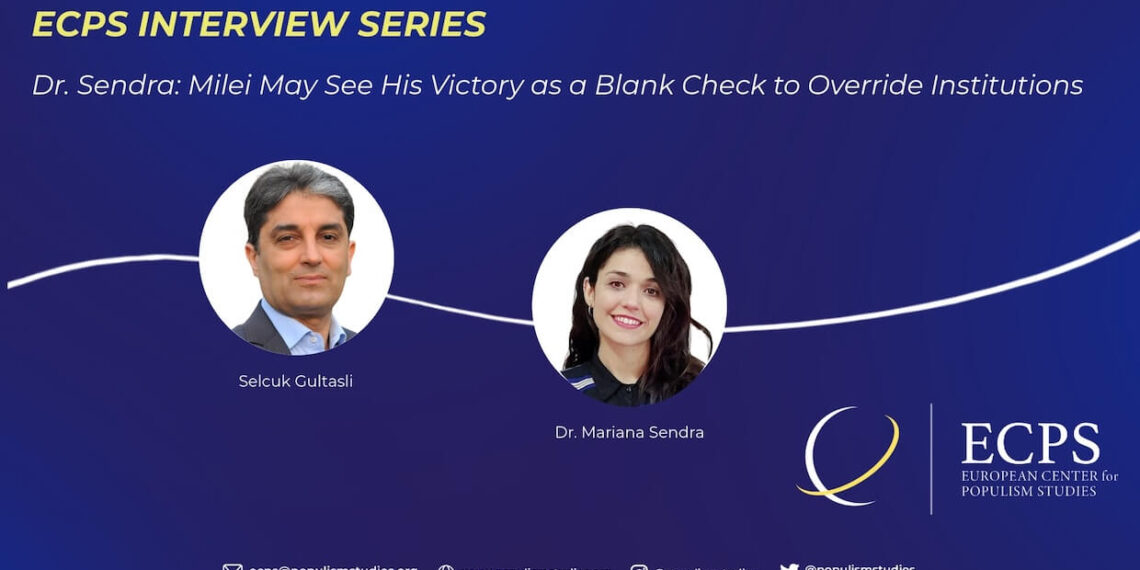In a wide-ranging interview with the ECPS, Dr. Mariana Sendra, Postdoctoral Researcher at the University of Deusto, examines the endurance and contradictions of Javier Milei’s populist-neoliberal experiment in Argentina. She interprets Milei’s strong midterm showing as “an endorsement of his government—but not a blank check,” warning that he and his followers “might interpret this electoral support as a green light to override institutional constraints.” Dr. Sendra highlights the exhaustion of Peronism, the influence of US backing, and Milei’s alignment with transnational far-right networks. While his administration remains formally democratic, she cautions that Argentina’s “democratic coexistence” is under pressure from rising intolerance and exclusion, calling on observers to “remain vigilant.”
Interview by Selcuk Gultasli
In the wake of Argentina’s pivotal midterm elections—widely regarded as a referendum on President Javier Milei’s two years in office—Dr. Mariana Sendra, Postdoctoral Researcher in Social and Human Sciences at the University of Deusto, offers a penetrating analysis of Argentina’s evolving political landscape in her interview with the European Center for Populism Studies (ECPS).
Dr. Sendra explains that Milei’s strong electoral performance, with La Libertad Avanza securing over 40 percent of the national vote, can be seen as “an endorsement of Milei’s government and of the future reforms that at least part of society considers necessary.” Yet, she cautions, “this is not, of course, a blank check for Milei.” According to her, many voters sought to avert economic instability following US Treasury Secretary Scott Bessent’s suggestion that Washington’s financial support might be withdrawn if Milei performed poorly.
In assessing the opposition’s weakness, Dr. Sendra highlights the exhaustion of Peronism and its credibility crisis. After years of alternating rule and recurring scandals, “the movement does not have the legitimacy to point out Milei’s own mistakes,” she notes, arguing that “people simply do not see them as a credible alternative.”
The interview delves into Milei’s fusion of radical market liberalism and populist rhetoric, a dynamic Dr. Sendra explored in her co-authored study “Is Milei a Populist?” She calls this a conceptual “puzzle,” since neoliberalism “dismantles the idea of ‘the people’ as a collective subject,” whereas populism depends on it. Milei, she observes, reframes the shrinking of the state “not as a loss, but as a way to make room for individual initiative.”
Addressing Milei’s international alignments, Dr. Sendra underscores the significance of “the Trump factor” and US financial intervention, which she describes as “a form of foreign interference.” However, she distinguishes Milei from nativist far-right leaders, arguing that “his ideology is not nativist” but rooted in a nostalgic vision of Argentina’s 19th-century prosperity.
At the institutional level, Dr. Sendra warns that Milei’s growing concentration of power and confrontational leadership style could erode democratic safeguards. “Milei and his followers might interpret this electoral support as a green light—or a kind of blank check—to override institutional constraints,” she cautions. Still, she notes that Argentinian civil society and political elites retain “the institutional resources to push back if he crosses certain lines.”
Looking ahead, Dr. Sendra predicts that Milei’s model could endure if inflation continues to decline and middle-class sectors remain shielded from austerity. Yet she foresees long-term risks: “His policies will produce inequality and exclusion,” she concludes, “but we will see that in the long term.”


